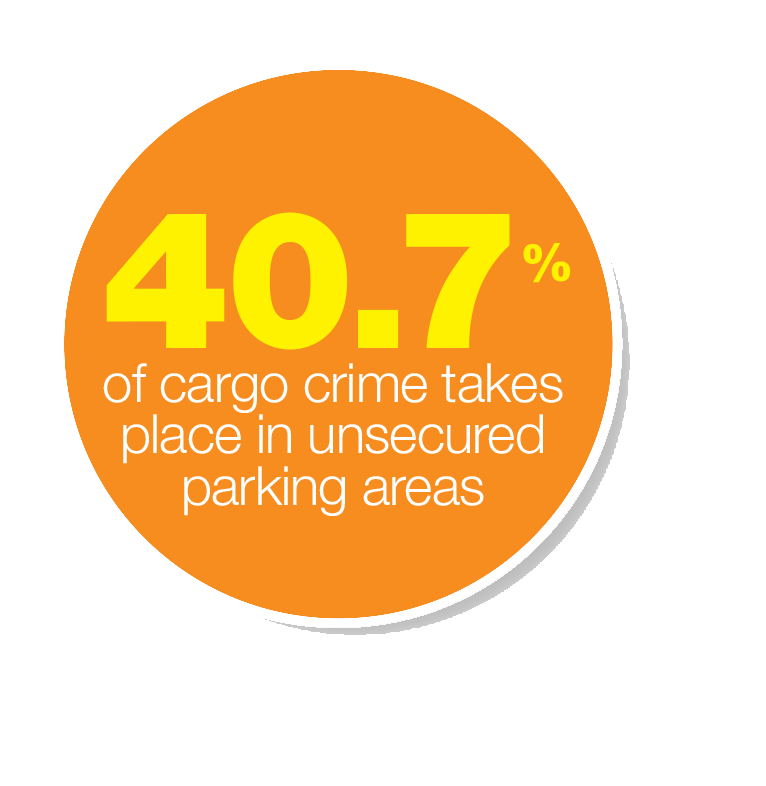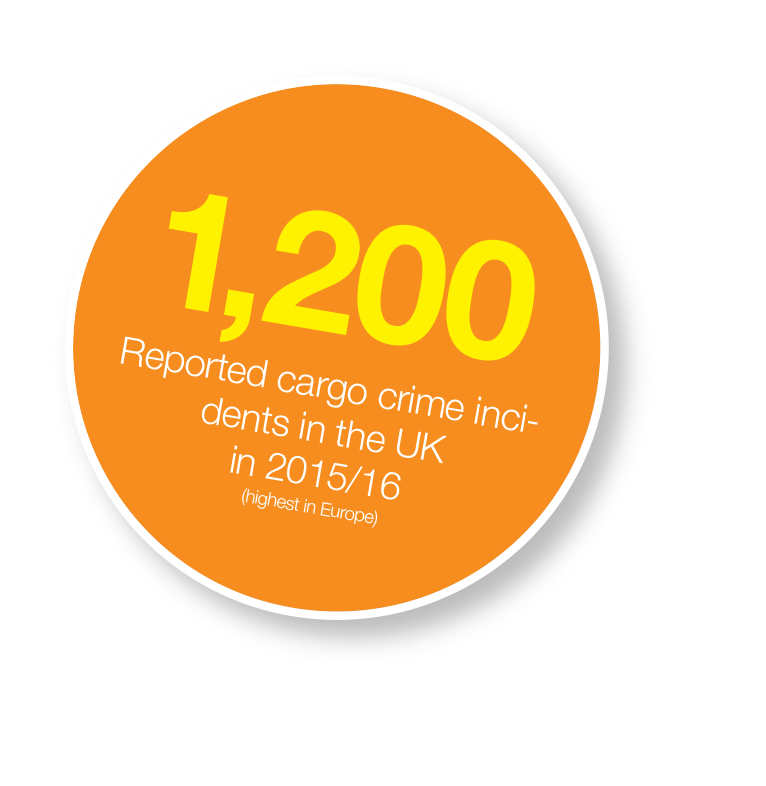Protecting your business, protecting your drivers
With more than 31m commercial vehicles on European roads, the opportunities for organised gangs to engage in cargo crime are immense. Since 2007 there has been a 41% increase in the value of stolen cargo. It is believed that across Europe the average loss per reported incident is €68.3k, the estimated total value of stolen cargo is €11.6bn per annum, and there are between 1,500-2,000 individual recorded incidents each year*
The good news is that by using some simple security measures, you can reduce the risk of cargo crime affecting your business.
Looking after your drivers
Professional drivers – both HGV and LCV – are usually in sole control of their vehicle and its load. According to the British Security Industry Association this places them in the ‘highest level risk’ category. Hi-jacking is a particular threat. Drivers should be advised:
- Watch out for bogus police and DVSA officers
- Be alert to mock road diversions/closed road scenarios
- Don’t fall for ‘Round the corner’ theft – a common technique of diverting the driver to another, spurious, delivery location
- If asked to stop: keep engine running, doors locked, windows closed, until you’re sure they are genuine
- Don’t stop for hitch hikers, don’t offer breakdown assistance
- Keep your mobile charged
- Be vigilant – keep an eye out for vehicles following you for long periods
The costs of cargo crime
It’s not just the obvious cost of theft that hits your business, there are hidden costs too:
- Replacing stolen goods/shortfall in insurance settlement
- Repairs to damage/recovery of vehicle
- Vehicle hire whilst the vehicle is being repaired/recovered
- Loss of business reputation
- Possible penalties for late delivery
- Insurance premium increase
- Additional time spent on administration/investigation
- Impact on your drivers (soft costs and potential hard cost of days lost due to stress/injury etc.)
Terrorism: vehicle as a weapon
Between 2015 and early 2019, across the UK and Europe, there were 15 terrorist attacks using commercial vehicles, killing 140 innocent people. Such attacks are hard to track because of their relative unsophistication but simple security measures can play a part in reducing this threat. Everyone has a role to play.
For employers, measures include security instructions in their drivers’ induction/handbook; driver photo ID cards and pre-agreed frames for reporting delayed arrival times.
Drivers must always lock and secure their vehicle when leaving the cab; keys should be kept with them at all times; only use planned routes but avoid always using the same routes. Above all, report suspicious behaviour.

- Fit for purpose – is the vehicle suitable to securely transport the goods?
- Lock down – specify robust locking and security products to minimise risk
- Strict guidelines – implement a clear in-transit security policy for your drivers. For example: must they stay with the load at all times; are they allowed to stop – if so, where? Continually review procedures
- Leaving the cab – remove keys; doors locked and sealed; load not to be accessed en route
- Delivering the goods – what paperwork is required; who’s responsible for unloading; remind drivers to be aware of deception techniques
- Cargo at rest, cargo at risk – a high percentage of load theft takes place at weekends and from vehicles parked in unsecure truck stops. Don’t leave vehicles loaded any longer than necessary
Remember…
If asked to stop, remember, DVSA officers only operate in marked areas. Ask to see ID; do uniforms look correct? Only pull over in safe, well lit, public places. Phone your transport manager.
If you are hijacked, don’t attempt to resist; do what you’re told; raise the alarm at the earliest opportunity; try to remember details about your attackers.
Further Information
How to report incidents of cargo crime
By phone:
- In an emergency always call: 999
- For non-emergency enquiries/reports call: 101
- Police Anti-Terrorist Hotline: 0800 780 321
By email:
- freight@navcis.pnn.police.uk (NaVCIS – National Vehicle Crime Intelligence Service)
Sources of information:
The statistics quoted in this poster came from the following sources:
- Cargo and Road Transport Security Guide 2017
- Vehicles as Weapons: a Threat and Policy Assessment 2018 (search ‘Vehicle as Weapon’
- TAPA (Transported Asset Protection Association) report (2015/16) Shortfalls and variances in cargo crime reporting across the EU may mean that some figures are not entirely accurate
- For more tips on guarding against cargo crime, visit www.rha.uk.net (search ‘Vehicle Security’)


